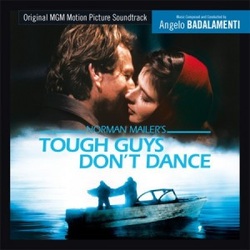
Matching the oversized and outlandish nature of the film is a score by composer Angelo Badalamenti. Perhaps the film's only saving grace, Badalamenti's music is a surprisingly full-bodied effort, a lush, eclectic score that at times evokes the timeless, sweeping works of John Barry and Georges Delerue. Despite being a respectable score on its own, Badalamenti's Tough Guys Don't Dance has suffered a sketchy release history, no doubt due in part to the film it was attached to. For a long time, the score was a collector's item, only being released on LP by Varèse Sarabande and on a truncated, Silva Screen CD release that bafflingly coupled the score with tracks from a number of Charles Bronson films. Finally, though, Music Box Records has released the complete Prague recording of the score, transferred from the original 2" 24-track analog session masters and 1/2" 2-track album mixes stored in the MGM vaults. The album contains released, previously unreleased, and unused cues, amounting in total to around 47 minutes of music.
On album, the score immediately strikes the listener as an accomplished but rather directionless effort. It is indeed hard to construct a narrative from it due to the film's own wildly shoddy narrative, and the composer explores an unusually diverse set of styles and ideas in it. As much as the score is led astray by these multiple personalities, they nevertheless offer Badalamenti numerous chances to flaunt his talents in varying styles. There's everything from sweeping romanticism to regal horn pieces to energetic chamber work to rumbling suspense. Inevitably, a solid narrative takes the backseat to these experiments, but they offer an intriguing ride nonetheless.
The star of this release is Badalamenti's sweeping love theme, rife with Golden-Age nostalgia. Heard most prominently in "Main Title", this is a timeless piece on lush strings, harp, and brass that would be at home in any compilation of Badalamenti's career highlights. Oozing sentimentality and longing, the theme far transcends the film it was written for. The more intimate "Loving Emotions" has the theme on cello, while the stirring conclusion of "Beautiful Madeleine" equals its romantic appeal on violin, before puzzlingly stopping midway through the theme's progressions. "From Cheers to Love" offers even more variation on piano and the score's typically lush string section before ending in a brief horn motif reminiscent of a minor John Williams flourish. Badalamenti is at his best when he's exploring these bigger, romantic ideas, yet the score also offers a few curiosities in other forms.
"Beware Ye Pilgrims" is a curiously regal piece performed on robust brass, while "Lonely Madden" conveys a sense of wonder with delicate female vocals and swirling underscore. The harpsichord-led bits in "Renaissance Prince" and "Wardley's Exit" push the score in the direction of chamber music, while "Two Heads Fight" pulls it yet again in another direction, that of Badalamenti's trademark electronics. The implementation of them here, however, is nowhere near on par with Badalamenti's better known efforts for the films of David Lynch. Aside from the accompanying pop songs "You'll Come Back (You Always Do)" by Mel Tillis and "Real Man" by Pam Tillis (both of which were co-composed with lyricists Danielle Badalamenti and Norman Mailer and draw from Angelo Badalamenti's themes), the rest of the release is defined by distinctly "old school" suspense material. The aptly-titled "Cacophonic Bugs" and "Swirling Confusion" are typical of this side of the score, with major-key trembling strings and occasional stingers doing a lot of the heavy lifting. The descent into fairly standard mystery/suspense material comes as a bit of a disappointment after the promising opening trio of "Main Title", "Beware Ye Pilgrims" and "Lonely Madden", but this is surely not why one should seek out this score anyway. Rather, the lush romanticism and swooning nostalgia of Badalamenti's main theme and it's many incarnations are a much more effective draw, and this expanded release from Music Box Records provides a few more welcomed snippets of this material. If you are seeking to revisit some of Badalamenti's older orchestral work after last year's Stalingrad, don't forget to look into this exceptional release!

 RSS Feed
RSS Feed
